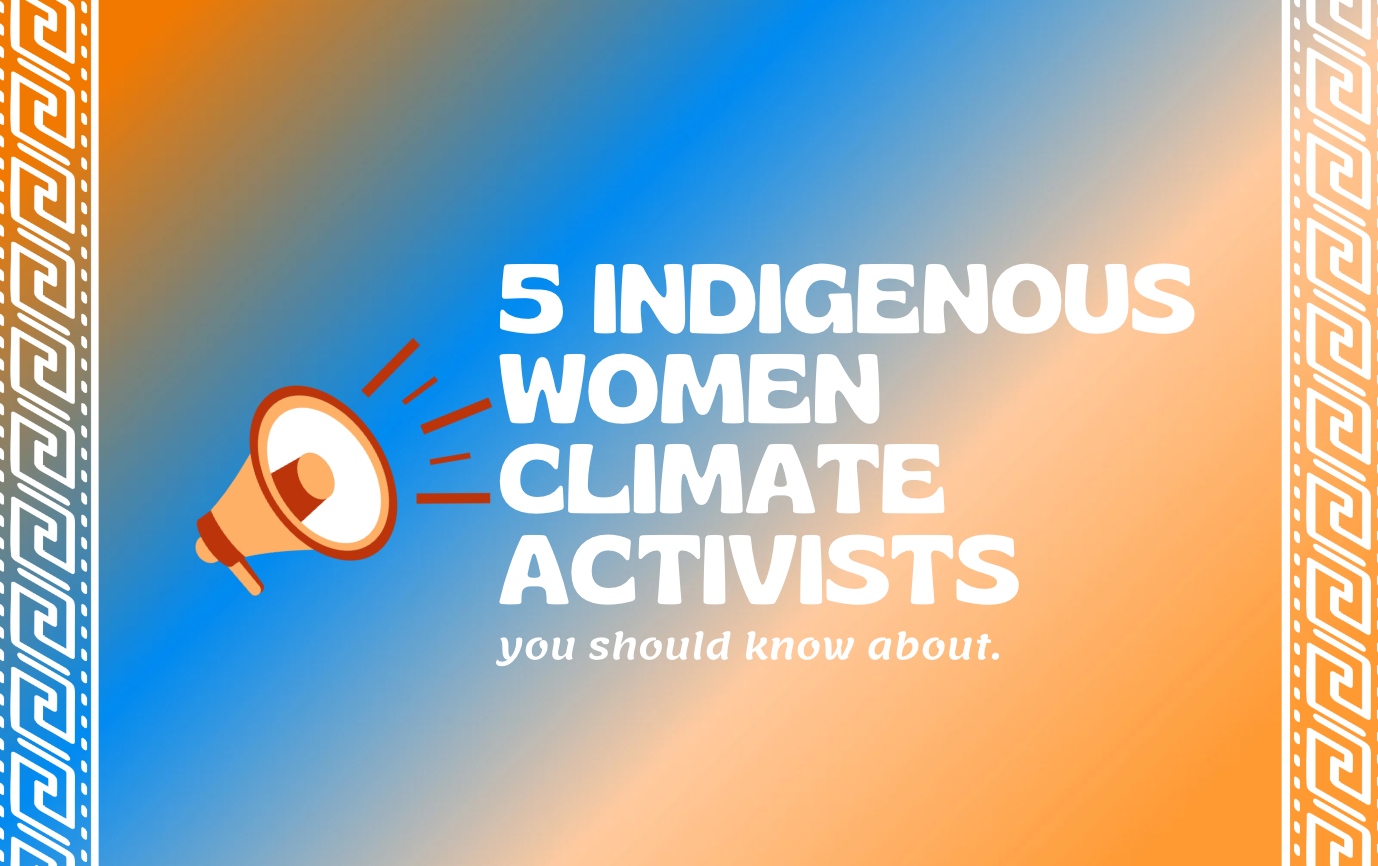
As custodians of natural resources and archivists of scientific and traditional knowledge, Indigenous women play an essential role in preserving forests and natural ecosystems. Indigenous women are indispensable to achieving climate justice, taking the lead to defend Indigenous peoples’ lands and territories and advocating for Indigenous peoples’ collective rights worldwide.
The 2022 International Day of World’s Indigenous Peoples highlights “The role of Indigenous women in the preservation and transmission of traditional knowledge”. Here are five Indigenous women climate activists you should know about:
1. Lola Cabnal, Maya Q’eqchí, Guatemala

Lola Cabnal is a Mayan Q’eqchí woman from a rural community in the municipality of Livingston, Guatemala. She is the Chair of the Council of Indigenous Women and Biodiversity, and a climate advocacy strategist for Ak’ Tenamit Association.
Lola is also among the Indigenous peoples’ and civil society representatives to the UN-REDD Programme’s Executive Board, where she has given voice to the perspective of Indigenous women and communities, reinforcing UN-REDD’s inclusive, gender-responsive, rights-based approach. Indigenous peoples and other forest-dependent communities are disproportionately impacted by climate injustices and are often left out of the political decision-making process, even though they are rights and knowledge holders.
Lola’s work in political advocacy for the Q’eqchí peoples carries extreme significance, for young Indigenous women in particular. By educating others on the rights and knowledge of her own community, Lola is paving the way for young Indigenous climate activists to advocate for the respect and recognition they deserve.
2. Verónica Inmunda, Kichwa, Ecuador

Verónica Inmunda, a Kichwa woman from the Ecuadoran Amazon, is the Youth, Culture and Sports Coordinator at CONFENIAE (Confederación de Nacionalidades Indígenas de la Amazonía Ecuatoriana). She is a law student focusing on the protection of Indigenous peoples’ rights and is a passionate advocate for the creation of a new model to integrate Indigenous knowledge and practices into the next generation’s educational awareness.
Verónica is one of the leaders of the Sacred Headwaters Initiative, which is building a shared vision among Indigenous peoples, non-governmental organization, the philanthropic community, social entrepreneurs and governments towards establishing a protected region across Peru and Ecuador that is off limits to industrial-scale resource extraction and is governed in accordance with traditional Indigenous principles of cooperation and harmony that foster a mutually enhancing human-nature relationship.
The Initiative is led by Amazonian Indigenous federations CONFENIAE (Ecuador), AIDESEP (Peru), ORPIO and COICA, in partnership with Pachamama Alliance and Fundación Pachamama.
Of the initiative Verónica says: “For us, the Sacred Headwaters is a symbol of peace, a symbol of harmony, a symbol of unity, and above all, it is a symbol that we want our rainforest to remain intact in a hundred years and beyond.”
Listen to her powerful message recorded for an event at the 2019 UN Climate Conference (COP 25), organized by SHE Changes Climate:
3. Rukka Sombolinggi, Toraja, Sulawesi, Indonesia

Rukka, a Torajan woman from the highlands of Sulawesi, is the first female Secretary General of the Indigenous Peoples Alliance of the Archipelago (AMAN), the world’s largest national-level Indigenous peoples organization. She is also the new co-President of the Global Alliance for Territorial Communities, a worldwide network that unites some of the largest Indigenous associations working to protect forests and promote climate change solutions stemming from Indigenous traditional knowledge. Coming from a lineage of Indigenous rights defenders, Rukka and her family have been rigorously advocating for Indonesian Indigenous rights for the past 30 years.
Rukka joined the Regional Indigenous Peoples Programme at UNDP’s Asia Pacific Reginal Centre in Bangkok, Thailand as Programme Specialist in 2007 and returned to AMAN in early 2011 as Project Manager. Throughout her career, she has been the voice of Indigenous communities across Malaysia, Philippines, Indonesia and Timor-Leste, becoming an influential voice among Indigenous women not only in Southeast Asia but globally as well.
4. Hindou Oumarou Ibrahim, Mbororo, Chad

Hindou, a Mbororo Indigenous pastoralist woman, is the founder of the Association of Indigenous Peul Women and Peoples of Chad (AFPAT), a community-based organization focused on promoting the rights of girls and women in the Mbororo community and inspiring leadership and advocacy in environmental protection. She is an influential climate leader in Africa, advocating for the importance of traditional knowledge in building resilience of Indigenous and forest communities to cope with the climate crisis.
In 2016, Hindou was selected to represent civil society at the signing of the historic Paris Agreement on climate change. She holds several leadership positions and actively promotes the value of Indigenous knowledge in mitigating the effects of climate change. She is Co-chair of the Facilitative Working Group of the Local Communities and Indigenous Peoples Platform for the UN Convention on Climate Change, as well as a member of the United Nations Permanent Forum on Indigenous Issues, and a member of the Executive Committee for the Indigenous Peoples of Africa Coordinating Committee (IPACC).
In an event on carbon finance for the forest sector organized by the Forest Declaration Platform during the 21st session of the UN Permanent Forum on Indigenous Issues, Hindou said: “As Indigenous peoples, we know how to protect our forests. We know how to manage funding. You just have to respect the way we do it. We want to be partners, not recipients or beneficiaries.” Hindou continues to advocate for the critical importance of shifting climate finance directly to Indigenous communities.
5. Grace Balawag, Kankaney-Igorot, The Phillipines

Grace, a Kankaney-Igorot Indigenous woman from the Philippines, is the deputy coordinator for the Climate Change Adaptation and Mitigation Program of the Tebtebba-Indigenous Peoples’ International Centre for Policy Research and Education. She also coordinates the Indigenous Peoples’ Partnership on Climate Change, Forests and Sustainable Development, called the Elatia Partnership, with 19 Indigenous peoples organizations in 14 countries in Asia, Africa and Latin America.
Grace joined policy advocacy work for Indigenous peoples under Tebtebba at the global and regional levels, in relation to climate change, biodiversity, sustainable development and human rights, especially Indigenous peoples’ rights. She has also served as an Indigenous people’s representative to the UN-REDD Programme Policy Board, and is a member of the Facilitative Working Group of the Local Communities and Indigenous Peoples Platform (FWG-LCIPP) under the UN Framework Convention on Climate Change (UNFCCC).

